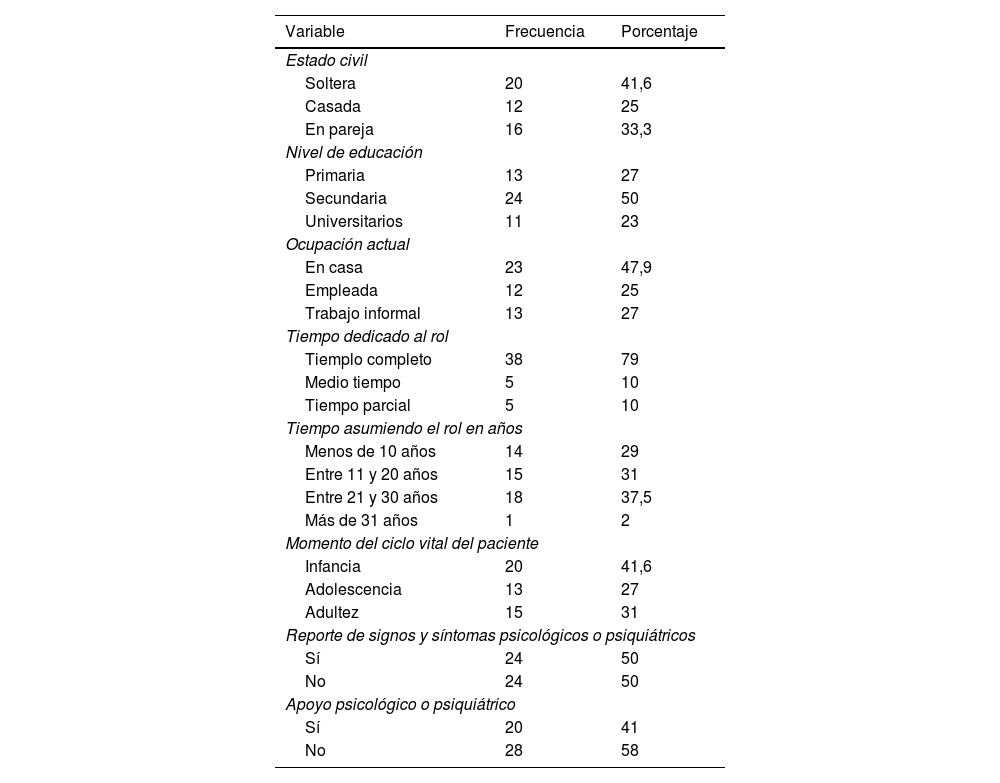Las enfermedades raras o huérfanas representan un reto para el sistema de salud y la calidad de vida de los pacientes y sus familias. En Colombia, las madres asumen el rol principal de cuidadoras, enfrentando desafíos físicos, emocionales y financieros. Este estudio busca comprender la experiencia de las mujeres madres cuidadoras de pacientes con mucopolisacaridosis (MPS) en Colombia y las variables asociadas a la sobrecarga del cuidador.
MétodoEstudio mixto, se aplicó la escala de sobrecarga del cuidador de Zarit a 48 mujeres cuidadoras de hijos e hijas con mucopolisacaridosis y respondieron a una entrevista estructurada individual.
ResultadosLa escala arrojó que el 92% de las participantes no tenía sobrecarga. Sin embargo, las entrevistas revelaron una variedad de emociones y sentimientos negativos, como soledad, tristeza, miedo y culpa. La presencia de un proyecto de vida inconcluso con roles sociales sobrecargados y como principal recurso la fe en Dios. Se encontraron tensiones en el tejido relacional con el hijo, hija o paciente, entre la sobreprotección y la independencia.
ConclusionesComprender la experiencia de las cuidadoras de pacientes con MPS permitió develar los elementos complejos del cuidado a través de los 3roles que se entrecruzan: ser mujer, ser madre y ser cuidadora. El uso de la religiosidad como indicador del bienestar físico y mental confirma su beneficio en los procesos de afrontamiento de las dificultades relacionadas con la experiencia del diagnóstico y el tratamiento.
Rare or orphan diseases represent a challenge for the health system and the quality of life of patients and their families. In Colombia, mothers assume the main role of caregivers, facing physical, emotional, and financial challenges. This study aims to understand the experience of women who are mothers and caregivers of patients with Mucopolysaccharidosis in Colombia, and the variables associated with caregiver burden.
MethodA mixed study was conducted in which the Zarit Caregiver Overload Scale was applied to 48 female caregivers of children with Mucopolysaccharidosis, and they were given an individual structured interview.
ResultsThe Zarit scale showed that 92% of the participants did not have overload. However, the interviews revealed a variety of negative emotions and feelings, such as loneliness, sadness, fear, and guilt. The women expressed an unfinished life project, with overloaded social roles and a constant permanent crisis. The main emotional resource and support wase faith in God. Tensions were found in the relational fabric with the child or patient, between overprotection and independence.
ConclusionsUnderstanding the experience of the caregivers of patients with MPS allowed unveiling the complex elements of caregiving through the 3intertwined roles: being a woman, being a mother and being a caregiver. The use of religiosity as an indicator of physical and mental well-being confirms its benefit in the processes of coping with the difficulties related to the experience of diagnosis and treatment.










